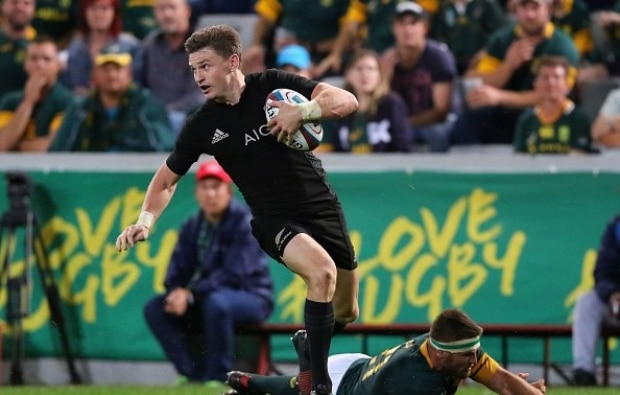A second-place finish for the Springboks in the Rugby Championship would signify progress – but only in the context of a nightmare two-year period, writes JON CARDINELLI.
Heyneke Meyer’s Springboks lost seven of their eight Tests against the All Blacks. Between 2012 and 2015, the then Bok coach lamented the gap that existed between the two Test nations.
Remember those days? Remember when the Springboks used to win four matches and finish second in the Rugby Championship (in 2013 and 2014)?
Remember how angry the South African rugby community was in the wake of those tournaments? Second place, we said, would never be good enough. A two-point defeat to arguably the best rugby team of all time in a World Cup semi-final? Still not good enough.
The Springboks, we said, do not settle for second place. South African rugby, we said, should hold itself to a higher standard. Things needed to change.
And so they did, unfortunately for the worse.
Nearly two years down the line, and many South African supporters would give anything for a two-point defeat to the All Blacks. Indeed, after a 2016 season that witnessed a 41-13 loss in New Zealand and then a record 57-15 defeat at home, it would be fair to say that a couple of narrow defeats to the All Blacks and a second-place finish in the 2017 Rugby Championship could be viewed as a sign of progress.
That result, viewed over a longer timeline though, would just be more of the same.
The Springboks haven’t won the southern hemisphere’s premier tournament since 2009. Over the past eight years, their struggles away from home, and particularly against the All Blacks – whom they’ve beaten only three times in New Zealand in the professional era – have impacted on their ability to claim the trophy.
Allister Coetzee’s Springboks will have more modest ambitions in 2017, though. After suffering historic losses to Ireland, Argentina and Italy in 2016, and after those record defeats to the All Blacks, they will be looking to win back some respect and finish where many South African teams have finished before: in second place.
That outcome would signify progress in the context of the past two years. Coetzee’s Boks will have to win four games (two more than they did in 2016). They would have to beat Argentina in Argentina for the first time, and in doing so, register the side’s first Test win on foreign soil since 2015.
They would also have to beat the Wallabies in Australia. Only one Bok team, namely the side of 2013, has managed to do that since 2009.
Meyer told a New Zealand newspaper recently that the Boks still trail the All Blacks by some distance. This much is clear when one considers the results of the South African teams in the 2017 Super Rugby tournament. The results against Kiwi teams show why there is no reason to hope for a Bok win on New Zealand soil this year, or against the All Blacks in South Africa.
Eighteen games were played between South African and New Zealand teams in the 2017 Super Rugby tournament. Fifteen matches were lost by the South African teams, including the final between the Lions and Crusaders at Ellis Park.
The Crusaders became the first team in the history of the tournament to traverse the Indian Ocean and win a Super Rugby final. That feat signified another first for New Zealand rugby, and another blow for the South African rugby psyche.
Can the Boks win in Australia in this year’s Rugby Championship? Rugby in that part of the world is as low as its ever been in the professional era. This season, the South African teams have combined for 10 wins in 15 Super Rugby matches against Aussie teams, five of those in Australia. It wouldn’t surprise to see a Bok side winning there this year.
One would also expect the Springboks to beat the Pumas, both home and away. The Jaguares, who fielded a host of international stars over the course of their Super Rugby campaign, lost six out of nine games against South African opposition. In Argentina, however, the South African teams combined for two wins and two losses.
The Springboks looked a better side in the three-Test series against France. Their forwards dominated and their defence looked both hungry and organised. On the basis of those performances, South Africa should expect an improved showing from the Boks in the Rugby Championship.
However, one needs to remember that France were hardly title contenders in the 2017 Six Nations and that they came to South Africa after a long season in Europe. The likes of Argentina, Australia and New Zealand will demand more of the Boks over the next few months.
One of the biggest problems that Coetzee and company will face is the dearth of experience in the current side. Duane Vermeulen and Warren Whiteley are unlikely to feature in the campaign due to injuries.
Only three players in the 34-man squad have more than 30 Test caps. As many as 17 of the 34 have 10 or fewer caps, and three of those have yet to play a match for the Boks.
Bear in mind that that is what the Springboks will start with. The situation will worsen if a few of the more experienced players in the squad break down with injuries over the course of the tournament.
Coetzee will hope that the more seasoned players remain fit over the next two weeks. The Springboks need to win both matches against Argentina if they are to have any chance of improving on last year’s log finish (third).
A win in Australia would be a terrific result in the context of the past eight years, as well as a boost in the context of the 2017 campaign. If the Boks tick that box, then four wins and possibly a second-place finish will be there for the taking.
Photo: Anesh Debiky/AFP Photo





